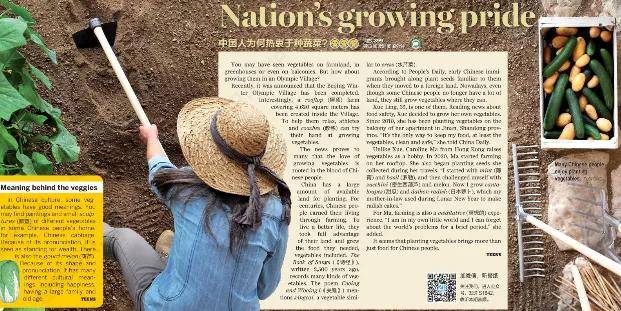- 行业新闻
-
“种菜”——刻在我们DNA里的热爱
发布时间:2021-10-20 08:28 点击:
文章转载自 21英语微商城 21世纪英文报
说到“种菜”,谁的DNA又动了?
“中国人爱种菜”最近总被大家“调侃”
大到我国的火星探测
好奇火星可不可以种菜
“
You may have seen vegetables on farmland, in greenhouses or even on balconies. But how about growing them in an Olympic Village?
你可能在农田、温室甚至阳台上见过蔬菜。但是你见过在奥运村种菜的吗?
Recently, it was announced that the Beijing Winter Olympic Village has been completed. Interestingly, a rooftop (屋顶) farm covering 4,620 square meters has been created inside the Village. To help them relax, athletes and coaches (教练) can try their hand at growing vegetables.
近日,北京冬奥村正式建成。有意思的是,奥运村里有一个占地4620平方米的“屋顶农场”。运动员和教练可以通过在里面种菜得到放松。

“
China has a large amount of available land for planting. For centuries, Chinese people earned their living through farming. To live a better life, they took full advantage of their land and grew the food they needed, vegetables included. The Book of Songs (《诗经》), written 2,500 years ago, records many kinds of vegetables.
几个世纪以来,中国人以务农为生。为了过上更好的生活,他们充分利用土地来种植食物。2500年前的《诗经》里还记载着各种各样的蔬菜。
Meaning behind the veggies
蔬菜背后的美好寓意
In Chinese culture, some vegetables have good meanings. You may find paintings and small sculptures (雕塑) of different vegetables in some Chinese people’s home, for example, Chinese cabbage. Because of its pronunciation, it is seen as standing for wealth. There is also the gourd melon (葫芦). Because of its shape and pronunciation, it has many different cultural meanings, including happiness, having a large family and old age.
在中国文化中,有些蔬菜有很好的寓意。你可以在一些中国人的家中发现一些关于蔬菜的画或小雕像,例如白菜——因为它的发音,白菜被视为财富的象征。还有葫芦,由于它的形状和发音,让它拥有了更多的寓意——幸福、家庭美满等等。
勤劳是中华民族传统美德
更何况种菜解压又健康
何乐而不为!
世联翻译-让世界自由沟通!专业的全球语言翻译供应商,上海翻译公司专业品牌。丝路沿线56种语言一站式翻译与技术解决方案,专业英语翻译、日语翻译等文档翻译、同传口译、视频翻译、出国外派服务,加速您的全球交付。 世联翻译公司在北京、上海、深圳等国际交往城市设有翻译基地,业务覆盖全国城市。每天有近百万字节的信息和贸易通过世联走向全球!积累了大量政商用户数据,翻译人才库数据,多语种语料库大数据。世联品牌和服务品质已得到政务防务和国际组织、跨国公司和大中型企业等近万用户的认可。








